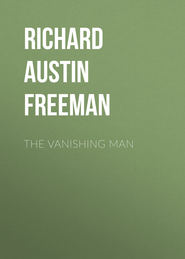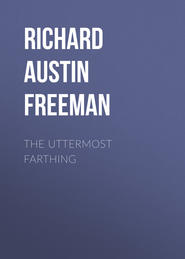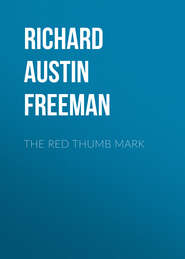По всем вопросам обращайтесь на: info@litportal.ru
(©) 2003-2024.
✖
The Eye of Osiris
Настройки чтения
Размер шрифта
Высота строк
Поля
"Well," said Thorndyke, "don't let us keep you from your duties, with poor Barnard currant picking in the Grecian Isles. But come in and see us again. Drop in when you like after your work is done. You won't be in our way even if we are busy, which we very seldom are after eight o'clock."
I thanked Dr. Thorndyke most heartily for making me free of his chambers in this hospitable fashion and took my leave, setting forth homeward by way of Middle Temple Lane and the Embankment; not a very direct route for Fetter Lane, it must be confessed; but our talk had revived my interest in the Bellingham household and put me in a reflective vein.
From the remarkable conversation that I had overheard it was evident that the plot was thickening. Not that I supposed that these two respectable gentlemen really suspected one another of having made away with the missing man; but still, their unguarded words, spoken in anger, made it clear that each had allowed the thought of sinister possibilities to enter his mind—a dangerous condition that might easily grow into actual suspicion. And then the circumstances really were highly mysterious, as I realized with especial vividness now after listening to my friend's analysis of the evidence.
From the problem itself my mind traveled, not for the first time during the last few days, to the handsome girl, who had seemed in my eyes the high-priestess of this temple of mystery in the quaint little court. What a strange figure she had made against this strange background, with her quiet, chilly, self-contained manner, her pale face, so sad and worn, her black, straight brows and solemn gray eyes, so inscrutable, mysterious, Sibylline. A striking, even impressive, personality this, I reflected, with something in it somber and enigmatic that attracted and yet repelled.
And here I recalled Jervis's words: "The girl must have been in it if the father was." It was a dreadful thought, even though only speculatively uttered, and my heart rejected it; rejected it with indignation that rather surprised me. And this notwithstanding that the somber black-robed figure that my memory conjured up was one that associated itself with the idea of mystery and tragedy.
CHAPTER IV
LEGAL COMPLICATIONS AND A JACKAL
My meditations brought me by a circuitous route, and ten minutes late, to the end of Fetter Lane, where, exchanging my rather abstracted air for the alert manner of a busy practitioner, I strode briskly forward and darted into the surgery with knitted brows, as though just released from an anxious case. But there was only one patient waiting, and she saluted me as I entered with a snort of defiance.
"Here you are, then?" said she.
"You are perfectly correct, Miss Oman," I replied; "in fact, you have put the case in a nutshell. What can I have the pleasure of doing for you?"
"Nothing," was the answer. "My medical adviser is a lady; but I've brought a note from Mr. Bellingham. Here it is," and she thrust the envelope into my hand.
I glanced through the note and learned that my patient had had a couple of bad nights and a very harassing day. "Could I have something to give me a night's rest?" it concluded.
I reflected for a few moments. One is not very ready to prescribe sleeping draughts for unknown patients, but still, insomnia is a very distressing condition. In the end I temporized with a moderate dose of bromide, deciding to call and see if more energetic measures were necessary.
"He had better take a dose of this at once, Miss Oman," said I, as I handed her the bottle, "and I will look in later and see how he is."
"I expect he will be glad to see you," she answered, "for he is all alone to-night and very dumpy. Miss Bellingham is out. But I must remind you that he's a poor man and pays his way. You must excuse my mentioning it."
"I am much obliged to you for the hint, Miss Oman," I rejoined. "It isn't necessary for me to see him, but I should like just to look in and have a chat."
"Yes, it will do him good. You have your points, though punctuality doesn't seem to be one of them," and with this parting shot Miss Oman bustled away.
Half-past eight found me ascending the great, dim staircase of the house in Nevill's Court preceded by Miss Oman, by whom I was ushered into the room. Mr. Bellingham, who had just finished some sort of meal, was sitting hunched up in his chair gazing gloomily into the empty grate. He brightened up as I entered, but was evidently in very low spirits.
"I didn't mean to drag you out after your day's work was finished," he said, "though I am very glad to see you."
"You haven't dragged me out. I heard you were alone, so I just dropped in for a few minutes' gossip."
"That is really kind of you," he said heartily. "But I'm afraid you'll find me rather poor company. A man who is full of his own highly disagreeable affairs is not a desirable companion."
"You mustn't let me disturb you if you'd rather be alone," said I, with a sudden fear that I was intruding.
"Oh, you won't disturb me," he replied; adding, with a laugh: "It's more likely to be the other way about. In fact, if I were not afraid of boring you to death I would ask you to let me talk my difficulties over with you."
"You won't bore me," I said. "It is generally interesting to share another man's experiences without their inconveniences. 'The proper study of mankind is—man,' you know, especially to a doctor."
Mr. Bellingham chuckled grimly. "You make me feel like a microbe," he said. "However, if you would care to take a peep at me through your microscope, I will crawl on to the stage for your inspection, though it is not my actions that furnish the materials for your psychological studies. It is my poor brother who is the Deus ex machina, who, from his unknown grave, as I fear, pulls the strings of this infernal puppet-show."
He paused and for a space gazed thoughtfully into the grate as if he had forgotten my presence. At length he looked up and resumed:
"It is a curious story, Doctor—a very curious story. Part of it you know—the middle part. I will tell you it from the beginning, and then you will know as much as I do; for, as to the end, that is known to no one. It is written, no doubt, in the book of destiny, but the page has yet to be turned.
"The mischief began with my father's death. He was a country clergyman of very moderate means, a widower with two children, my brother John and me. He managed to send us both to Oxford, after which John went into the Foreign Office and I was to have gone into the Church. But I suddenly discovered that my views on religion had undergone a change that made this impossible, and just about this time my father came into a quite considerable property. Now, as it was his expressed intention to leave the estate equally divided between my brother and me, there was no need for me to take up any profession for a livelihood. Archeology was already the passion of my life, and I determined to devote myself henceforth to my favorite study, in which, by the way, I was following a family tendency; for my father was an enthusiastic student of ancient Oriental history, and John was, as you know, an ardent Egyptologist.
"Then my father died quite suddenly, and left no will. He had intended to have one drawn up, but had put it off until it was too late. And since nearly all the property was in the form of real estate, my brother inherited practically the whole of it. However, in deference to the known wishes of my father, he made me an allowance of five hundred a year, which was about a quarter of the annual income. I urged him to assign me a lump sum, but he refused to do this. Instead, he instructed his solicitor to pay me an allowance in quarterly instalments during the rest of his life; and it was understood that, on his death, the entire estate should devolve on me, or if I died first, on my daughter, Ruth. Then, as you know, he disappeared suddenly, and as the circumstances suggested that he was dead, and there was no evidence that he was alive, his solicitor—a Mr. Jellicoe—found himself unable to continue the payment of the allowance. On the other hand, as there was no positive evidence that my brother was dead, it was impossible to administer the will."
"You say the circumstances suggested that your brother was dead. What circumstances were they?"
"Principally the suddenness and completeness of the disappearance. His luggage, as you may remember, was found lying unclaimed at the railway station; and there was another circumstance even more suggestive. My brother drew a pension from the Foreign Office, for which he had to apply in person, or, if abroad, produce proof that he was alive on the date when the payment became due. Now, he was exceedingly regular in this respect; in fact, he had never been known to fail, either to appear in person or to transmit the necessary documents to his agent, Mr. Jellicoe. But from the moment when he vanished so mysteriously to the present day, nothing whatever has been heard of him."
"It's a very awkward position for you," I said, "but I should think there will not be much difficulty in obtaining the permission of the Court to presume death and to proceed to prove the will."
Mr. Bellingham made a wry face. "I expect you are right," he said, "but that doesn't help me much. You see, Mr. Jellicoe, having waited a reasonable time for my brother to reappear, took a very unusual but, I think, in the special circumstances, a very proper step; he summoned me and the other interested party to his office and communicated to us the provisions of the will. And very extraordinary provisions they turned out to be. I was thunderstruck when I heard them. And the exasperating thing is that I feel sure my poor brother imagined that he had made everything perfectly safe and simple."
"They generally do," I said, rather vaguely.
"I suppose they do," said Mr. Bellingham; "but poor John has made the most infernal hash of his will, and I am certain that he has utterly defeated his own intentions. You see, we are an old London family. The house in Queen Square where my brother nominally lived, but actually kept his collection, has been occupied by us for generations, and most of the Bellinghams are buried in St. George's burial-ground close by, though some members of the family are buried in other churchyards in the neighborhood. Now, my brother—who, by the way, was a bachelor—had a strong feeling for the family traditions, and he stipulated, not unnaturally, in his will that he should be buried in St. George's burial-ground among his ancestors, or, at least, in one of the places of burial appertaining to his native parish. But instead of simply expressing the wish and directing his executors to carry it out, he made it a condition affecting the operation of the will."
"Affecting it in what respect?" I asked.
"In a very vital respect," answered Mr. Bellingham. "The bulk of the property he bequeathed to me, or if I predeceased him, to my daughter Ruth. But the bequest was subject to the condition I have mentioned—that he should be buried in a certain place—and if that condition was not fulfilled, the bulk of the property was to go to my cousin, George Hurst."
"But in that case," said I, "as you can't produce the body, neither of you can get the property."
"I am not so sure of that," he replied. "If my brother is dead, it is pretty certain that he is not buried in St. George's or any of the other places mentioned, and the fact can easily be proved by production of the registers. So that a permission to presume death would result in the handing over to Hurst of almost the entire estate."
"Who is the executor?" I asked.
"Ah!" he exclaimed, "there is another muddle. There are two executors; Jellicoe is one, and the other is the principal beneficiary—Hurst or myself, as the case may be. But, you see, neither of us can become an executor until the Court has decided which of us is the principal beneficiary."
"But who is to apply to the Court? I thought that was the business of the executors."
"Exactly, that is Hurst's difficulty. We were discussing it when you called the other day, and a very animated discussion it was," he added, with a grim smile. "You see, Jellicoe naturally refuses to move in the matter alone. He says he must have the support of the other executor. But Hurst is not at present the other executor; neither am I. But the two of us together are the co-executor, since the duty devolves upon one or other of us, in any case."
"It's a complicated position," I said.
"It is; and the complication has elicited a very curious proposal from Hurst. He points out—quite correctly, I am afraid—that as the conditions as to burial have not been complied with, the property must come to him, and he proposes a very neat little arrangement, which is this: That I shall support him and Jellicoe in their application for permission to presume death and to administer the will, and that he shall pay me four hundred a year for life; the arrangement to hold good in all eventualities."
"What does he mean by that?"
"He means," said Bellingham, fixing me with a ferocious scowl, "that if the body should turn up at any future time, so that the conditions as to burial should be able to be carried out, he should still retain the property and pay me the four hundred a year."
"The deuce!" said I. "He seems to know how to drive a bargain."
"His position is that he stands to lose four hundred a year for the term of my life if the body is never found, and he ought to stand to win if it is."
"And I gather that you have refused this offer?"
Другие электронные книги автора Richard Austin Freeman
The Vanishing Man




 4.67
4.67









